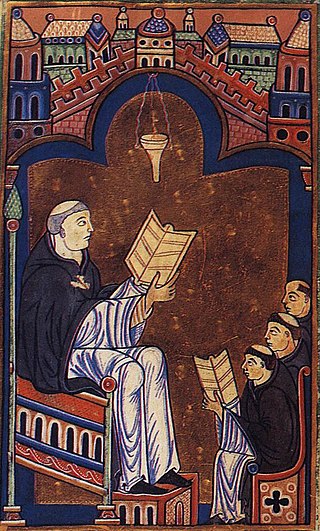
Richard of Saint Victor was a Medieval Scottish philosopher and theologian and one of the most influential religious thinkers of his time. A canon regular, he was a prominent mystical theologian, and was prior of the famous Augustinian Abbey of Saint Victor in Paris from 1162 until his death in 1173.

Victor-Marie Hugo, sometimes nicknamed the Ocean Man, was a French Romantic writer and politician. During a literary career that spanned more than sixty years, he wrote in a variety of genres and forms.

Les Misérables is a French historical novel by Victor Hugo, first published in 1862, that is considered one of the greatest novels of the 19th century. Les Misérables has been popularized through numerous adaptations for film, television and the stage, including a musical.

Symbolism was a late 19th-century art movement of French and Belgian origin in poetry and other arts seeking to represent absolute truths symbolically through language and metaphorical images, mainly as a reaction against naturalism and realism.

Éliphas Lévi Zahed, born Alphonse Louis Constant, was a French esotericist, poet, and writer. Initially pursuing an ecclesiastical career in the Catholic Church, he abandoned the priesthood in his mid-twenties and became a ceremonial magician. At the age of 40, he began professing knowledge of the occult. He wrote over 20 books on magic, Kabbalah, alchemical studies, and occultism.

Charles Forbes René de Montalembert was a French publicist, historian and Count of Montalembert, Deux-Sèvres, and a prominent representative of liberal Catholicism.
"God is dead" is a statement made by the German philosopher Friedrich Nietzsche. The first instance of this statement in Nietzsche's writings is in his 1882 The Gay Science, where it appears three times. The phrase also appears at the beginning of Nietzsche's Thus Spoke Zarathustra.

La Légende des siècles is a collection of poems by Victor Hugo, conceived as an immense depiction of the history and evolution of humanity.
La Fin de Satan is a long religious epic by Victor Hugo, of which 5,700 lines were written between 1854 and 1862, but left unfinished and published after his death.
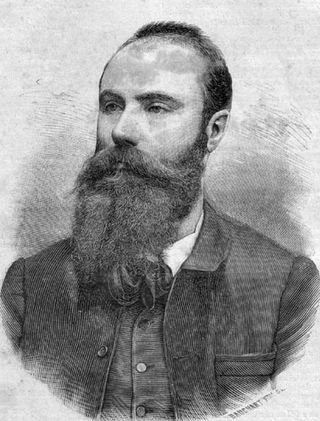
Maurice Bouchor was a French poet.
The Vingt Regards sur l'Enfant-Jésus are a suite of 20 pieces for solo piano by the French composer Olivier Messiaen (1908–1992).

Sylvain Maréchal was a French essayist, poet, philosopher and political theorist, whose views presaged utopian socialism and communism. His views on a future golden age are occasionally described as utopian anarchism. He was editor of the newspaper Révolutions de Paris.
The poems of Victor Hugo captured the spirit of the Romantic era. They were largely devoted to 19th-century causes. Many touched on religious themes. Initially they were royalist but soon became Bonapartist, Republican and liberal. Hugo's poems on nature revealed a continuing search for the great sublime.
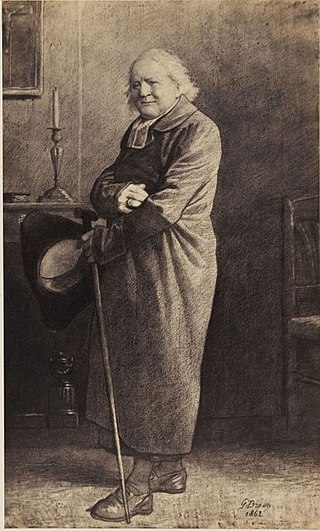
Bishop Charles-François-Bienvenu Myriel, referred to as Bishop Myriel or Monseigneur Bienvenu, is a fictional character in Victor Hugo's 1862 novel Les Misérables. Myriel is the Bishop of Digne in southeastern France.

Faverolles is a commune in the Aisne department in Hauts-de-France in northern France.

Louis Candide Boulanger was a French Romantic painter, pastellist, lithographer and a poet, known for his religious and allegorical subjects, portraits, genre scenes.
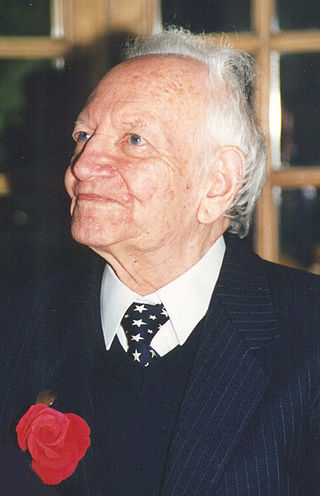
François Brousse was a philosophy professor who had mainly taught in the Languedoc-Roussillon region and is the author of some 80 works including poetry, essays, novels, plays and storybooks. He was a pioneer of the philosophy cafes that were popping up almost everywhere in France at the end of the 20th century. Brousse was born in Perpignan, France and died in Clamart, France.
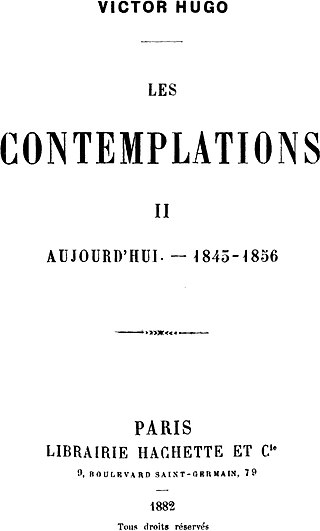
Les Contemplations is a song and collection of poetry by Victor Hugo, published in 1856. It consists of 156 poems in six books. Most of the poems were written between 1841 and 1855, though the oldest date from 1830. Memory plays an important role in the collection, as Hugo was experimenting with the genre of autobiography in verse. The collection is equally an homage to his daughter Léopoldine Hugo, who drowned in the Seine in 1843.

John of St. Samson (1571–1636), also known as Jean du Moulin or Jean de Saint-Samson, was a French Carmelite friar and mystic of the Catholic Church. He is known as the soul of the Touraine Reform of the Carmelite Order, which stressed prayer, silence and solitude. John was blind from the age of three after contracting smallpox and receiving poor medical treatment for the disease. He insisted very strongly on the mystical devotion of the Carmelites. He has been referred to as the "French John of the Cross" by students of Christian mysticism.
Méditations sur le Mystère de la Sainte Trinité is a work for organ by the French composer Olivier Messiaen. It was composed from 1967 to 1969 at Messiaen's house in Pétichet.















